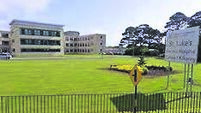Bail refused for man accused of causing fatal collision near Tullow

Judge Geraldine Carthy
A NIGERIAN national accused of causing the death of another motorist in a head-on collision outside Tullow has been remanded in custody after a judge deemed him a flight risk.
Abayomi Okanlawon appeared on crutches and with the assistance of a translator at Carlow District Court on 5 November, charged with dangerous driving causing death following a collision on 24 October. The court heard that the incident occurred at 6.43pm at Rath East, outside Tullow, when the defendant was driving a BMW towards Shillelagh. While overtaking, he drove head-on into a Seat Altea travelling in the opposite direction.
The driver of the Seat Altea was pronounced deceased at the scene, while his wife, who was a passenger in the vehicle, sustained injuries that are not life-threatening.
Garda Mick Morris gave evidence that Mr Okanlawon (32), who was the sole occupant of his vehicle, was knocked unconscious in the collision and had to be removed from the car. Four independent witnesses – two drivers behind each vehicle – provided statements to gardaí.
The court was told that the deceased had a forward-facing dashcam which recorded the incident, showing the defendant crossing a continuous white line. During an interview with gardaí, Mr Okanlawon made admissions stating that he had seen “the flash of headlights” just before the collision.
The defendant was arrested and admitted to hospital, but discharged himself against medical advice on 4 November. The garda said that Mr Okanlawon cited needing to inform his employer as one reason for leaving hospital but “I did tell him he could have asked nursing staff or gardaí to do this”. He added that dietary preferences were also a factor, as “he only eats African food” and “wasn’t eating in the hospital”.
Opposing bail, the garda told the court that the defendant has international protection status and is residing in an IPAS centre since making an application on 17 March 2024. He entered Ireland in 2024 using a photograph of his Nigerian passport on his phone.
“At this time, we have no passport or travel documentation for him,” the garda said. “There is no physical ID to establish his identity. Our view is that he poses a flight risk in light of a lack of formal identification and having no ties to the country.” The garda added that the defendant had no previous convictions in Ireland and no history of bench warrants, although inquiries to other jurisdictions are pending. His only tie to Ireland was his employment, with no family in the country.
Defence solicitor Tertius Van Eeden questioned whether a forensic collision report was before the court, to which the garda confirmed it was not yet available, although examination of the scene and vehicles had taken place.
Mr Van Eeden challenged the assertion that speed was a contributing factor, arguing it was “an opinion-based statement” that “can’t be definitely proven at this stage”.
The garda acknowledged this was true, but said they were basing their assessment on dashcam footage and witness statements, adding they were “close to the very high bar” of proving excessive speed.
Mr Van Eeden noted that his client had a valid work permit and was in the IPAS system, which precluded him from travelling outside the country. “He has no passport so he can’t leave,” he told the court, adding that the defendant “didn’t discharge [from hospital] with malicious intent” and is “traumatised, notwithstanding the gentleman who lost his life”.
Inspector Tom Jones interjected to say that “a work permit does not prove or disprove his identity”.
Judge Carthy acknowledged the presumption of innocence but said there was a need to ensure the defendant attends court. “Considering the evidence, there is a reasonable probability he won’t stand trial if granted bail,” she said.
“Given the seriousness of the charge and the evidence supporting the charge, I’m remanding the accused in custody until next week.” Mr Okanlawon will appear in court this week via videolink.
The judge also directed that any necessary medical treatment be provided to the defendant following a request from his solicitor.




